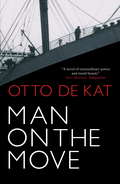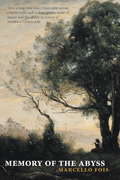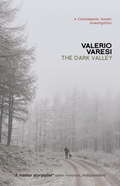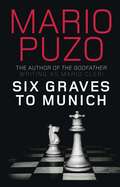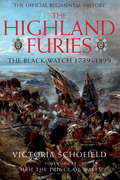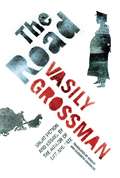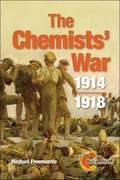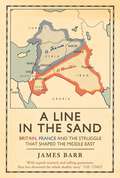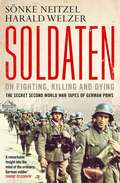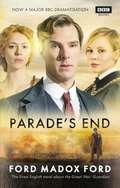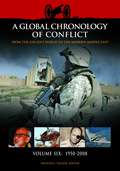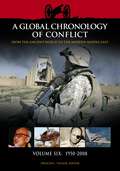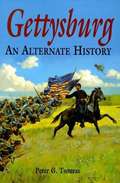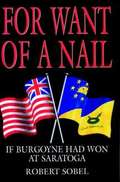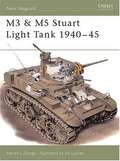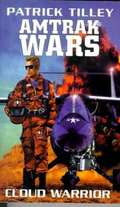- Table View
- List View
Man on the Move
by Otto de KatIn January 1935, Rob leaves Holland for Cape Town, a young man thirsting for adventure and wanting above all to leave his family's suffocating hold on him behind. After a brutal stint in the diamond mines, he sails to Java to join the Dutch forces in their last stand against the invading Japanese. Here he finds Guus, a fellow countryman and the best friend he will ever have. Elegant, painterly and poetic, Man on the Move is an unforgettable portrait of friendship, and the heart-wrenching story of a journey away from family into lonely adulthood, through war and captivity.
Memory of the Abyss
by Marcello FoisWhen Samuele Stocchino is two years old the village sage can already see a heart shaped like a wolf's head beating in his breast: the heart of a murderer. As a colonial soldier in Northern Africa, recruited from one subject land to subdue another, the sixteen-year-old Stocchino learns to kill before he has learned to love, and it is a skill he hones to perfection on the pitiless battlefields of the Corso Front in the Great War. Returning to Sardinia a hero to a pauper's welcome, he finds his family swindled and his sweetheart stolen away by the richest clan in the region, and from one first crime of passion a bitter feud is born. Stocchino terrorizes his wealthy neighbours and anyone who dares to till their land until, with Italy now firmly under Mussolini's boot, his elimination becomes Il Duce's priority. As he continues to elude capture, the seeds of myth are sown and the legend of Samuele Stocchino is forged. Shrouded by mystery and portent, Memory of the Abyss is a stirring fusion of myth, history and fiction, a daring re-imagining of the true story of a notorious Sardinian bandit and a deft excavation of the island's cultural roots by one of Italy's most gifted and celebrated writers.
River of Shadows: A Commissario Soneri Mystery
by Valerio VaresiIntroducing Commissario Soneri - Italy's answer to Inspector Maigret - and shortlisted for the C.W.A. International Dagger, River of Shadows is a brooding, visceral crime novel packed with atmosphere and tension."A master storyteller" Barry Forshaw, IndependentA relentless deluge lashes the Po Valley, and the river itself swells beyond its limits. A barge breaks free of its moorings and drifts erratically downstream; when finally it runs aground its seasoned pilot is nowhere to be found. The following day, an elderly man of the same surname falls from the window of a nearby hospital. Commissario Soneri, scornful of his superiors' scepticism, is convinced the two incidents are linked. Stonewalled by the bargemen who make their living along the riverbank, he scours the floodplain for clues. As the waters begin to ebb, the river yields up its secrets: tales of past brutality, bitter rivalry and revenge.
River of Shadows: A Commissario Soneri Mystery
by Valerio VaresiIntroducing Commissario Soneri - Italy's answer to Inspector Maigret - and shortlisted for the C.W.A. International Dagger, River of Shadows is a brooding, visceral crime novel packed with atmosphere and tension."A master storyteller" Barry Forshaw, IndependentA relentless deluge lashes the Po Valley, and the river itself swells beyond its limits. A barge breaks free of its moorings and drifts erratically downstream; when finally it runs aground its seasoned pilot is nowhere to be found. The following day, an elderly man of the same surname falls from the window of a nearby hospital. Commissario Soneri, scornful of his superiors' scepticism, is convinced the two incidents are linked. Stonewalled by the bargemen who make their living along the riverbank, he scours the floodplain for clues. As the waters begin to ebb, the river yields up its secrets: tales of past brutality, bitter rivalry and revenge.
The Dark Valley: A Commissario Soneri Investigation
by Valerio VaresiCommissario Soneri returns home for a hard-earned autumn holiday, hoping to spend a few days mushroom picking on the slopes of Montelupo. This isolated village relies on the salame factory founded in the post-war years by Palmiro Rodolfi, and now run by his son, Paride. On arrival, Soneri is greeted by anxious rumours about the factory's solvency and the younger Rodolfi's whereabouts. Not long afterwards, a decomposing body is found in the woods. In the shadow of Montelupo, carabinieri prepare to apprehend their chief suspect - an ageing woodsman who defended the same mountains from S.S. commandos during the war.
The Dark Valley: A Commissario Soneri Investigation
by Valerio VaresiCommissario Soneri returns home for a hard-earned autumn holiday, hoping to spend a few days mushroom picking on the slopes of Montelupo. This isolated village relies on the salame factory founded in the post-war years by Palmiro Rodolfi, and now run by his son, Paride. On arrival, Soneri is greeted by anxious rumours about the factory's solvency and the younger Rodolfi's whereabouts. Not long afterwards, a decomposing body is found in the woods. In the shadow of Montelupo, carabinieri prepare to apprehend their chief suspect - an ageing woodsman who defended the same mountains from S.S. commandos during the war.
Six Graves to Munich
by Mario PuzoIn the final days of the Second World War, Michael Rogan, an American intelligence officer, is tortured by a group of seven senior Gestapo officers who need to discover the secrets he alone can give them. Ten years later, when he has recovered from the appalling injuries he suffered, and determined to revenge the death of his wife at the hands of the same men, he begins a quest to track down and kill each one of his tormentors. Dark, violent, and graphic, this is an addictive thriller about how far one man will go to exact his own justice. Written a year before Puzo completed The Godfather, published under a pseudonym and only very recently brought to light, Six Graves to Munich bears all the hallmarks of a master storyteller.
Highland Furies: The Black Watch 1739-1899
by Victoria SchofieldAs the oldest of the Highland Regiments, The Black Watch has an enviable roster of Battle Honours and a mystique born of repeated service on behalf of King, Queen and country. On the strength of her acclaimed biography of Field Marshal Earl Wavell, the regimental trustees commissioned Victoria Schofield to write this, the first volume of her magisterial history of the The Black Watch, and have fully cooperated with her as she traces the story of the Regiment from its early 18th-century beginnings through to the eve of the South African War at the end of the 19th-century. Originating as companies of highland men raised to keep a 'watch' over the Highlands of Scotland, they were formed into a regiment in 1739. Its soldiers would go on to fight with extraordinary bravery and élan in almost every major engagement fought by the British Army during this period, from the American War of Independence, the Peninsular Wars, Waterloo, the Crimea, Indian Mutiny to Egypt and the Sudan. Drawing on diaries, letters and memoirs, Victoria Schofield skilfully weaves the multiple strands of this story into an epic narrative of a valiant body of officers and men over one-and-a-half centuries. In her sure hands, the story of The Black Watch is no arid recitation of campaigns, dates and battle honours, but is instead a rich and compelling record of the soldier's experience under fire and on campaign. It is also a celebration of the deeds of a regiment that has played a unique role in British history and a vivid insight into the lives of the many remarkable figures who have marched and fought so proudly under its Colours.
The Road: Short Fiction and Essays
by Vasily GrossmanBy the author of Life and Fate, now a major Radio 4 drama starring Kenneth Branagh. Vasily Grossman is widely recognized as one of the outstanding literary figures of the twentieth century. The short fiction collected here - satire, comedy, tragedy and pure narrative - illustrate the remarkable breadth of his work, and demonstrate all the bold intelligence, delicate irony and extraordinary vividness for which he has become known. In addition to the eleven stories, this volume includes the complete text of 'The Hell of Treblinka', one of the first descriptions of a Nazi extermination camp; a powerful and harrowing piece of journalism written only weeks after the camp was dissolved. Beautifully illuminated by Robert Chandler's introductions and endnotes, with photographs from the family archive, and an Afterword by Grossman's stepson, Fyodor Guber.
The Chemists' War: 1914-1918
by Michael FreemantleWithin months of the start of the First World War, Germany began to run out of the raw materials it needed to make explosives. As Germany faced imminent defeat, chemists such as Fritz Haber and Carl Bosch came to the rescue with Nobel Prize winning discoveries that overcame the shortages and enabled the country to continue in the war. Similarly, Britain could not have sustained its war effort for four years had it not been for chemists like Chaim Weizmann who was later to become the first president of the State of Israel. Michael Freemantle tells the stories of these and many other chemists and explains how their work underpinned and shaped what became known as The Chemists' War. He reveals: * how chemistry contributed to the care of the sick and wounded and to the health and safety of troops; * how coal not only powered the war but was also an important source of the chemicals needed for the manufacture of explosives, dyes, medicines and antiseptics; * how Britain's production of propellants relied on the slaughter of tens of thousands of whales; * how a precious metal played a critical role in the war; * how poisonous chemicals were used as weapons of mass destruction for the first time in the history of warfare and how chemists developed gas masks for protection against these weapons; * how the British naval blockade of Germany imperilled agricultural production in the United States. The book will appeal to the general reader as well as the many scientists and historians interested in the Great War.
A Line in the Sand: Britain, France and the struggle that shaped the Middle East
by James BarrIn 1916, in the middle of the First World War, two men secretly agreed to divide the Middle East between them. Sir Mark Sykes was a visionary politician; François Georges-Picot a diplomat with a grudge. The deal they struck, which was designed to relieve tensions that threatened to engulf the Entente Cordiale, drew a line in the sand from the Mediterranean to the Persian frontier. Territory north of that stark line would go to France; land south of it, to Britain. The creation of Britain's 'mandates' of Palestine, Transjordan and Iraq, and France's in Lebanon and Syria, made the two powers uneasy neighbours for the following thirty years. Through a stellar cast of politicians, diplomats, spies and soldiers, including T. E. Lawrence, Winston Churchill and Charles de Gaulle, A Line in the Sand vividly tells the story of the short but crucial era when Britain and France ruled the Middle East. It explains exactly how the old antagonism between these two powers inflamed the more familiar modern rivalry between the Arabs and the Jews, and ultimately led to war between the British and French in 1941 and between the Arabs and Jews in 1948. In 1946, after many years of intrigue and espionage, Britain succeeded in ousting France from Lebanon and Syria, and hoped that, having done so, it would be able to cling on to Palestine. Using newly declassified papers from the British and French archives, James Barr brings this clandestine struggle back to life, and reveals, for the first time, the stunning way in which the French finally got their revenge.
Soldaten
by Sönke Neitzel Harald WelzerA trove of previously unpublished, transcribed conversations among German POWs - secretly recorded by the Allies - reveals the extent of their brutality and changes our understanding of the mind-set of the German soldier during World War II. On a visit to the British National Archive in 2001, Sonke Neitzel made a remarkable discovery: reams of meticulously transcribed conversations among German POWs that had been covertly recorded and recently declassified. Neitzel would later find another collection of transcriptions, twice as extensive, in the National Archive in Washington, D. C. These were discoveries that would provide a unique and profoundly important window into the true mentality of the soldiers in the Wehrmacht, the Luftwaffe, the German navy, and the military in general--almost all of whom had insisted on their own honourable behaviour during the war. Collaborating with renowned social psychologist Harald Welzer, Neitzel examines these conversations--and the casual, pitiless brutality omnipresent in them--from a historical and psychological perspective, and in reconstructing the frameworks and situations behind these conversations, they have created a powerful narrative of wartime experience. 'these extraordinary bugged conversation reveal through the eyes of German soldiers with stark clarity and candour the often brutal reality of the Second World War, providing remarkable insight into the mentality and behaviour of the Wehrmacht. ' Sir Ian Kershaw'Nothing short of sensational . . . [Soldaten] has the potential to change our view of the war. ' Der Spiegel
Parade's end
by Madox FordThis classic novel centres on Christopher Tietjens, an officer and gentleman. It follows him from the secure, orderly world of Edwardian England into the chaotic madness of the First World War. Against the backdrop of a world at war, the complex sexual warfare between Tietjens and his faithless wife Sylvia is played out. This is a story about love, betrayal and disillusionment in a time of horror and confusion.
A Global Chronology of Conflict: Volume 6, 1950-2008
by Spencer TuckerNow from ABC-CLIO, long regarded as a premier publisher of military history, comes a monumental resource that encapsulates the entire scope of conflict among human societies. Spanning nearly five millennia, from the earliest documented fighting to the present, A Global Chronology of Conflict: From the Ancient World to the Modern Middle East provides a comprehensive survey of major military events. With coverage that reaches beyond the battles, this work examines the political and diplomatic forces driving world conflicts, revolutions, forced changes of governments, international treaties, and acts of aggression and terrorism. Written by acclaimed military historian Spencer C. Tucker, these six chronologically organized volumes offer an accessible, richly detailed timeline of military conflict across human history. The concise entries cover all important events on the battlefield and in the corridors of power, with special features highlighting hundreds of key leaders and weapon systems. From specific data on casualties to coverage of evolving weapons technology to insightful analyses of the social impact of war, A Global Chronology of Conflict is an essential resource for students, researchers, history buffs, and general readers alike.
A Global Chronology of Conflict: Volume 3, 1775-1860
by Spencer TuckerNow from ABC-CLIO, long regarded as a premier publisher of military history, comes a monumental resource that encapsulates the entire scope of conflict among human societies. Spanning nearly five millennia, from the earliest documented fighting to the present, A Global Chronology of Conflict: From the Ancient World to the Modern Middle East , provides a comprehensive survey of major military events. With coverage that reaches beyond the battles, this work examines the political and diplomatic forces driving world conflicts, revolutions, forced changes of governments, international treaties, and acts of aggression and terrorism.Written by acclaimed military historian Spencer C. Tucker, these six chronologically organized volumes offer an accessible, richly detailed timeline of military conflict across human history. The concise entries cover all important events on the battlefield and in the corridors of power, with special features highlighting hundreds of key leaders and weapon systems. From specific data on casualties to coverage of evolving weapons technology to insightful analyses of the social impact of war, A Global Chronology of Conflict is an essential resource for students, researchers, history buffs, and general readers alike.
A Global Chronology of Conflict: Volume 5, 1919-1949
by Spencer TuckerThis six-volume reference (1. 5 million words) constitutes a seemingly monumental enterprise for one person, that one person being a meticulous expert who didn't confine himself to a simple chronology but instead expanded the project to encompass plenty of contextual and supplementary material. Tucker is a former army captain and intelligence analyst who served in the Pentagon during the Vietnam War and subsequently taught military history for decades at Texas Christian University and at Virginia Military Institute before retiring in 2003. Undaunted by the task at hand, he presents a year-by-year, event-by-event chronology, having made a set of criteria and guidelines for selection and presentation (these are explained in his preface). The volumes include, also, a total of 376 biographical profiles and 301 key innovations and technologies--weapons that changed history, as well as some 250 detailed descriptions of key battles throughout history, and a couple hundred maps. Each volume includes the comprehensive index.
A Global Chronology of Conflict: Volume 2, 1500-1774
by Spencer TuckerNow from ABC-CLIO, long regarded as a premier publisher of military history, comes a monumental resource that encapsulates the entire scope of conflict among human societies. Spanning nearly five millennia, from the earliest documented fighting to the present, A Global Chronology of Conflict: From the Ancient World to the Modern Middle East, provides a comprehensive survey of major military events. With coverage that reaches beyond the battles, this work examines the political and diplomatic forces driving world conflicts, revolutions, forced changes of governments, international treaties, and acts of aggression and terrorism.
A Global Chronology of Conflict: Volume 4, 1861-1918
by Spencer TuckerNow from ABC-CLIO, long regarded as a premier publisher of military history, comes a monumental resource that encapsulates the entire scope of conflict among human societies. Spanning nearly five millennia, from the earliest documented fighting to the present, A Global Chronology of Conflict: From the Ancient World to the Modern Middle East, provides a comprehensive survey of major military events. With coverage that reaches beyond the battles, this work examines the political and diplomatic forces driving world conflicts, revolutions, forced changes of governments, international treaties, and acts of aggression and terrorism.
A Global Chronology of Conflict: Volume 1, 3000 BCE–1499 CE
by Spencer TuckerFrom the heroic stand of the 300 Spartans at Thermopylae and the brutally efficient conquests of Genghis Khan's Mongol hordes, to the rain of arrows at Agincourt and the blood-stained hills around Gettysburg, this compelling work chronicles the history of conflict in all its guts and glory.
Gettysburg: An Alternative History
by Peter G. TsourasThe author has written an account of the Battle of Gettysburg as though some of the "What Ifs" had hapened. What if J.E.B. Stewart had arrived in time to be in the second day's fighting?, et. cet.
For Want of a Nail: If Burgoyne Had Won at Saratoga
by Robert SobelFor Want of a Nail is an alternate history classic. The outcome of one battle in the American Revolution diverges from reality, and sparks an unstoppable chain of events which affects the history of the whole North American continent.
M3 and M5 Stuart Light Tank, 1940-45
by Steven J. ZalogaThe M3 and M5 family of light tanks were the culmination of American tank development of the 1930s. By the time of the outbreak of the World War II, they were approaching obsolescence, as tank forces in Europe were shifting from light to medium tanks as the main element of their armored forces. First entering combat in the autumn of 1941 in the Western Desert with the British Army, the Stuart quickly proved its inadequacies. The M3 and M5 light tanks proved more suitable in the Pacific theater than in Europe, and fought successfully in many of the major battles including Guadalcanal, Tarawa and Peleliu. This title narrates this distinctive and unusual fighting vehicle's history.
The Medieval Warhorse From Byzantium to the Crusades
by Ann HylandThe history and development of the medieval warhorse, its breeding and care.
The Amtrak Wars, Book 1: Cloud Warrior
by Patrick TilleyTen centuries ago the Old Time ended when Earth's cities melted in the War of a Thousand Suns. Now the lethal high technology of the Amtrak Federation's underground stronghold is unleashed on Earth's other survivors - the surface-dwelling Mutes. But the primitive Mutes possess ancient powers greater than any machine...
